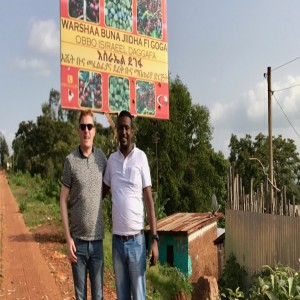
This is the third year of us having coffee from Ana Sora and wow am I excited to have it back again, mostly just to stop you lot asking for more! This coffee represents lots of time and energy working at the farmers gate in Ethiopia; not only that, but the coffee is the only private estate from which we have ever bought in Ethiopia. Add to these points the fact that it's one of the most unique coffees I have ever tasted, and you can understand why I’m excited and my inbox has been full of emails asking for more more more Ana Sora! Well here you go folks : D
This private farm is owned by Israel Degfa, a second generation coffee grower from Ethiopia. The farm covers 250 hectares, only 150 of which are currently producing coffee; however, it is estimated that the remaining 100 hectares will be in full coffee production by 2018.
Situated alongside the river Turo, the farm currently only produces naturally processed coffee. However, in future the farmers will take advantage of the water source and the planned increased production capacity to begin producing washed coffee too - yeah you know I'll get some when I can!
It's a very new farm as coffee farms go, only formed in 2013, and is located at a whopping altitude of between 1,900 and 2,350 metres above sea level. It is unusual to find private farms of 250 hectares in Ethiopia, and even more unusual to find them at such high altitudes. The high altitude helps with the slower maturation of the coffee cherry, and allows more time for the plant to develop which contributes to the super unique cup profile we see in coffees from Ethiopia.
Coffee growing is popular in this area, and Israel also sources coffee from the surrounding area populated by smallholder farmers who speak Oromife and are of Oromo ethnicity. Israel believes in helping these farmers through education in husbandry and also through financial assistance.
Cherries are hand-sorted for unripes and overripes before they go into floatation tanks, where the cherries are covered with water. Any cherries that float are removed. Whole, ripe cherries are then dried in the sunshine on raised African drying beds, which are laid out on hessian cloths for about 15–18 days depending on the weather conditions. The cherries are covered with plastic or shade nets during the midday heat and at night.
This is a really unique coffee that once again I am very happy and excited to share with you all.
In the cup you'll get a big mouthful of blueberry mousse. Up front it's muscovado sugar before the blueberry swoops in. There's little hits of lemon zest mixed in, before it finishes clean and crisp.
- Country: Ethiopia
- Area: Guji zone
- Nearest town: Yirgacheffe
- Farm: Ana Sora
- Varietal: Indigenous wild varietals
- Processing: Natural
- Owner: Israel Defga
- Founding year: 2013
- Altitude: 1,900 – 2,350 m.a.s.l.
- Farm size: 250 hectares, of which 150 hectares are coffee.
Clean cup: (1–8): 7.5
Sweetness: (1–8): 7
Acidity: (1–8): 6.5
Mouthfeel: (1–8): 6.5
Flavour: (1–8): 7
Aftertaste: (1–8): 6
Balance: (1–8): 6.5
Overall: (1–8): 7
Correction: (+36): +36
Total: (max. 100): 90
Roasting Information
Medium - not too fast, not too slow and drop it just before you reach second crack.
"Quick Look" Guide
Blueberry mousse, muscovado sugar, lemon zest.
More Episodes
Create your
podcast in
minutes
- Full-featured podcast site
- Unlimited storage and bandwidth
- Comprehensive podcast stats
- Distribute to Apple Podcasts, Spotify, and more
- Make money with your podcast
It is Free
- Privacy Policy
- Cookie Policy
- Terms of Use
- Consent Preferences
- Copyright © 2015-2024 Podbean.com







